Auditing and Assurance Services: Compliance with APES Standards
VerifiedAdded on 2023/06/10
|9
|1508
|141
AI Summary
This article discusses the importance of complying with APES standards while conducting audit operations. It covers various principles of auditing ethics and their violation, along with the creation of audit independence threats. The article also provides solutions to avoid such threats.
Contribute Materials
Your contribution can guide someone’s learning journey. Share your
documents today.
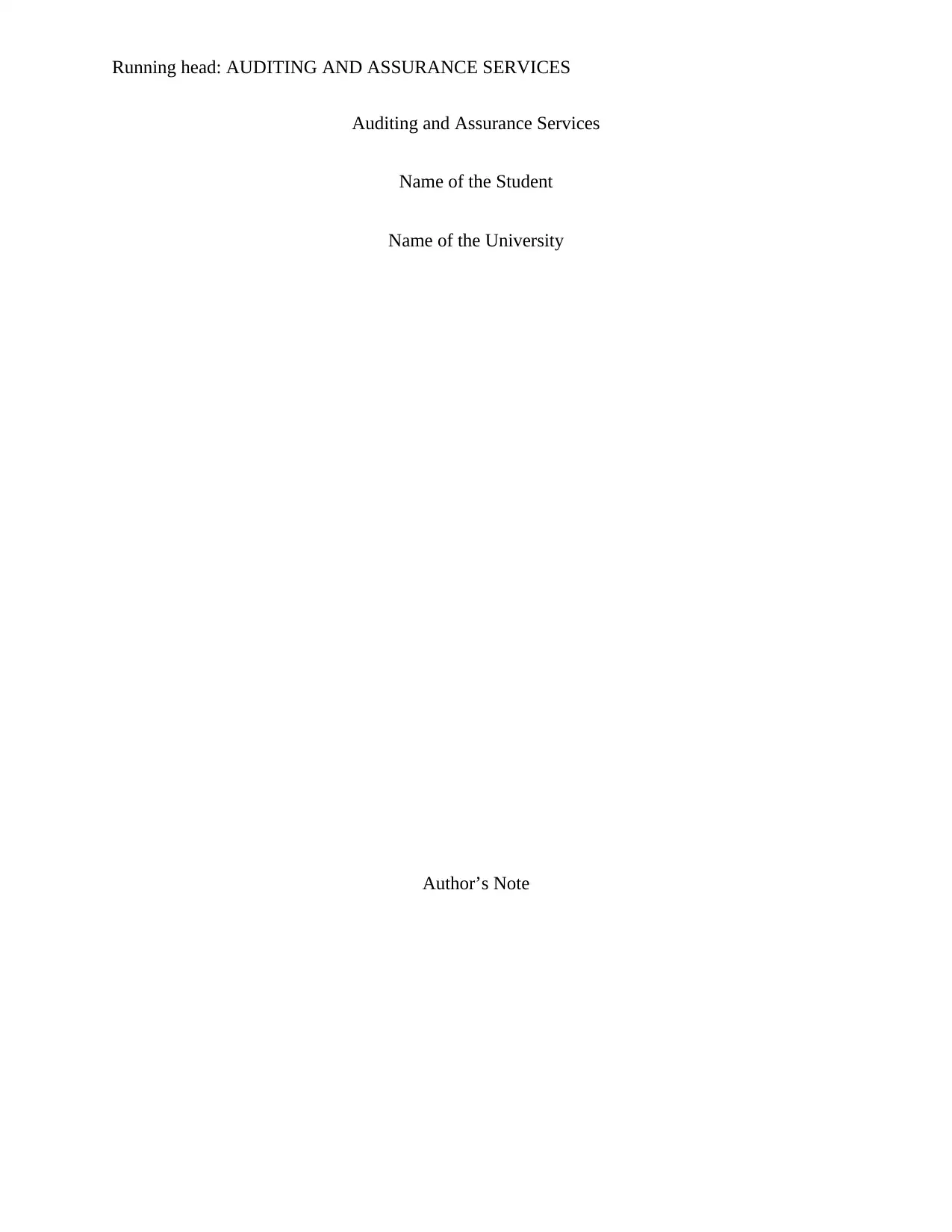
Running head: AUDITING AND ASSURANCE SERVICES
Auditing and Assurance Services
Name of the Student
Name of the University
Author’s Note
Auditing and Assurance Services
Name of the Student
Name of the University
Author’s Note
Secure Best Marks with AI Grader
Need help grading? Try our AI Grader for instant feedback on your assignments.
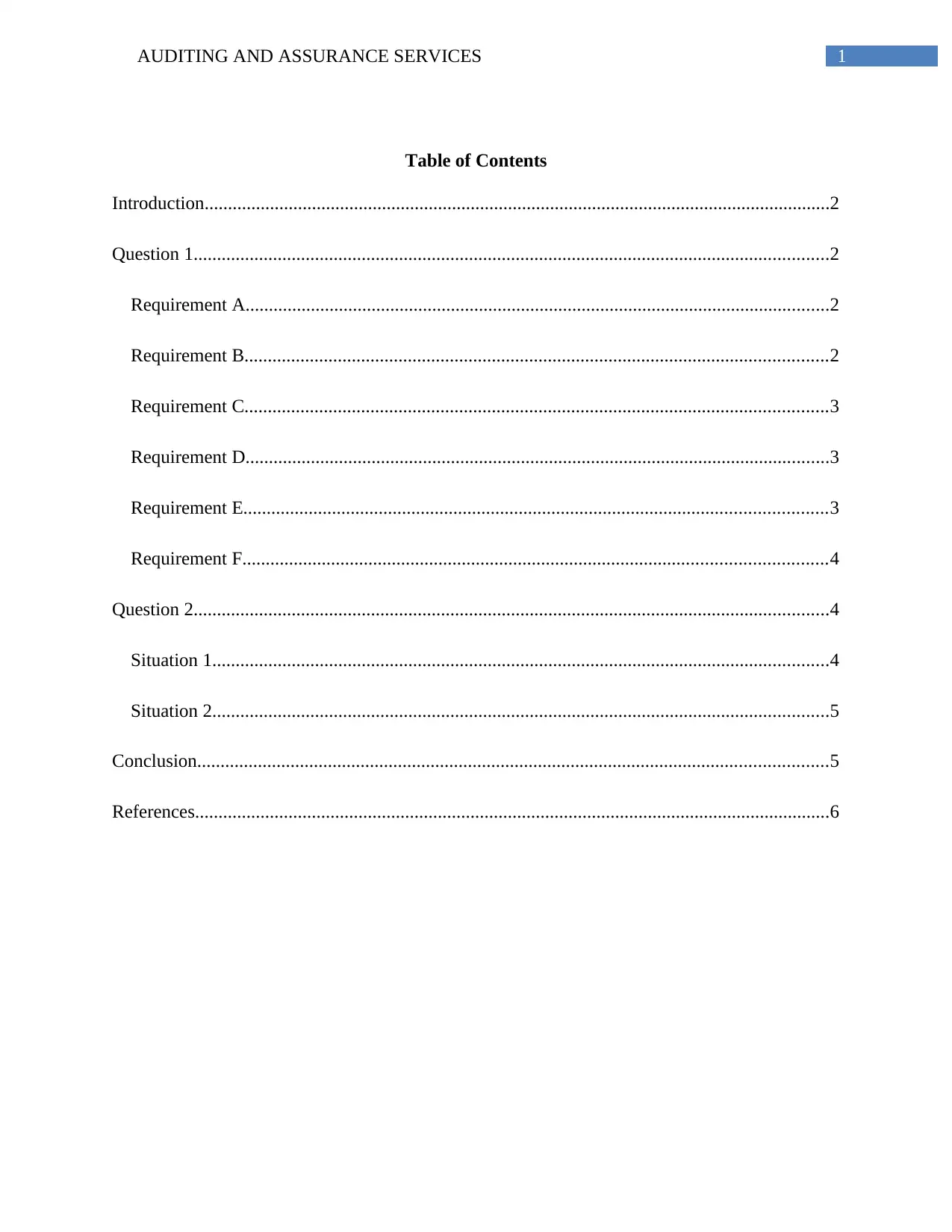
1AUDITING AND ASSURANCE SERVICES
Table of Contents
Introduction......................................................................................................................................2
Question 1........................................................................................................................................2
Requirement A.............................................................................................................................2
Requirement B.............................................................................................................................2
Requirement C.............................................................................................................................3
Requirement D.............................................................................................................................3
Requirement E.............................................................................................................................3
Requirement F.............................................................................................................................4
Question 2........................................................................................................................................4
Situation 1....................................................................................................................................4
Situation 2....................................................................................................................................5
Conclusion.......................................................................................................................................5
References........................................................................................................................................6
Table of Contents
Introduction......................................................................................................................................2
Question 1........................................................................................................................................2
Requirement A.............................................................................................................................2
Requirement B.............................................................................................................................2
Requirement C.............................................................................................................................3
Requirement D.............................................................................................................................3
Requirement E.............................................................................................................................3
Requirement F.............................................................................................................................4
Question 2........................................................................................................................................4
Situation 1....................................................................................................................................4
Situation 2....................................................................................................................................5
Conclusion.......................................................................................................................................5
References........................................................................................................................................6
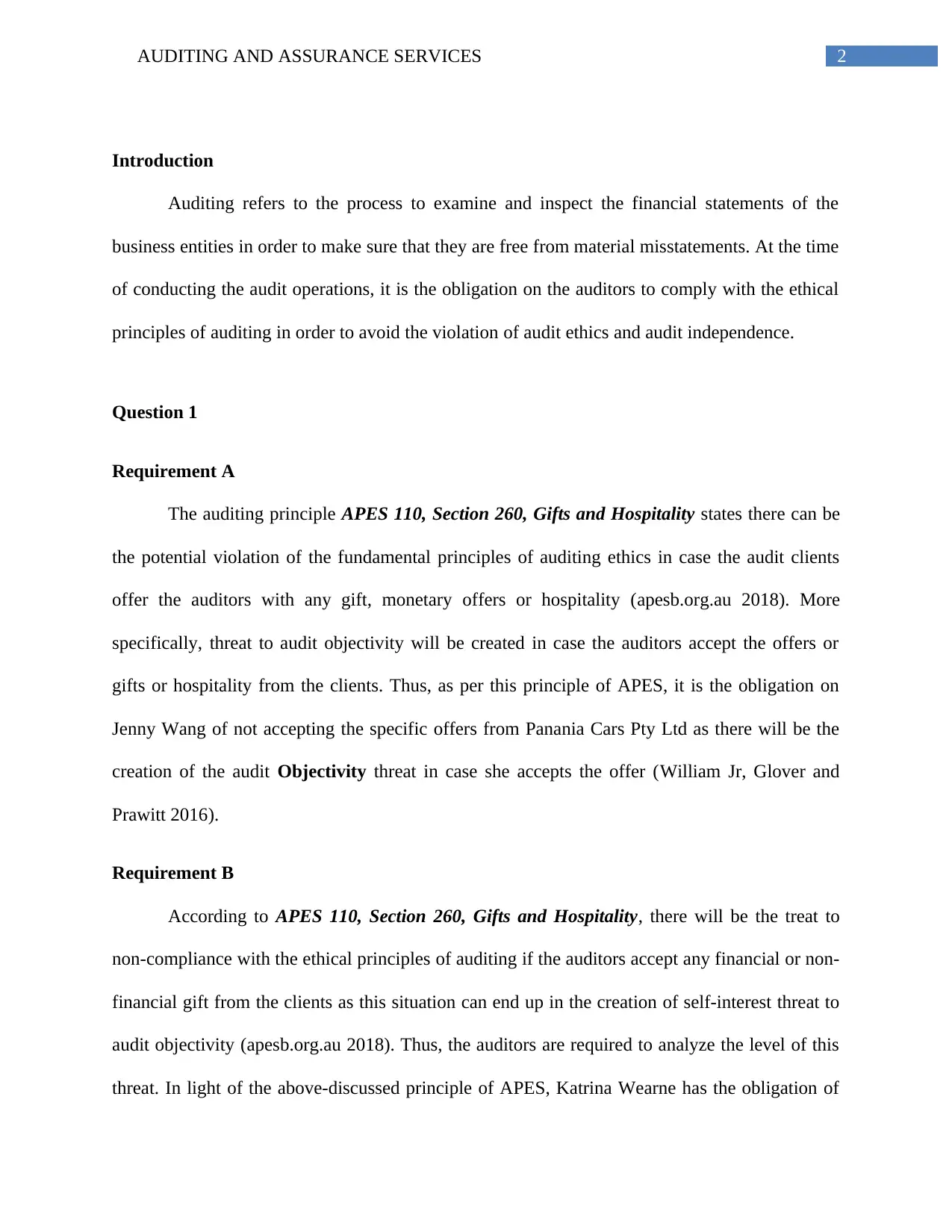
2AUDITING AND ASSURANCE SERVICES
Introduction
Auditing refers to the process to examine and inspect the financial statements of the
business entities in order to make sure that they are free from material misstatements. At the time
of conducting the audit operations, it is the obligation on the auditors to comply with the ethical
principles of auditing in order to avoid the violation of audit ethics and audit independence.
Question 1
Requirement A
The auditing principle APES 110, Section 260, Gifts and Hospitality states there can be
the potential violation of the fundamental principles of auditing ethics in case the audit clients
offer the auditors with any gift, monetary offers or hospitality (apesb.org.au 2018). More
specifically, threat to audit objectivity will be created in case the auditors accept the offers or
gifts or hospitality from the clients. Thus, as per this principle of APES, it is the obligation on
Jenny Wang of not accepting the specific offers from Panania Cars Pty Ltd as there will be the
creation of the audit Objectivity threat in case she accepts the offer (William Jr, Glover and
Prawitt 2016).
Requirement B
According to APES 110, Section 260, Gifts and Hospitality, there will be the treat to
non-compliance with the ethical principles of auditing if the auditors accept any financial or non-
financial gift from the clients as this situation can end up in the creation of self-interest threat to
audit objectivity (apesb.org.au 2018). Thus, the auditors are required to analyze the level of this
threat. In light of the above-discussed principle of APES, Katrina Wearne has the obligation of
Introduction
Auditing refers to the process to examine and inspect the financial statements of the
business entities in order to make sure that they are free from material misstatements. At the time
of conducting the audit operations, it is the obligation on the auditors to comply with the ethical
principles of auditing in order to avoid the violation of audit ethics and audit independence.
Question 1
Requirement A
The auditing principle APES 110, Section 260, Gifts and Hospitality states there can be
the potential violation of the fundamental principles of auditing ethics in case the audit clients
offer the auditors with any gift, monetary offers or hospitality (apesb.org.au 2018). More
specifically, threat to audit objectivity will be created in case the auditors accept the offers or
gifts or hospitality from the clients. Thus, as per this principle of APES, it is the obligation on
Jenny Wang of not accepting the specific offers from Panania Cars Pty Ltd as there will be the
creation of the audit Objectivity threat in case she accepts the offer (William Jr, Glover and
Prawitt 2016).
Requirement B
According to APES 110, Section 260, Gifts and Hospitality, there will be the treat to
non-compliance with the ethical principles of auditing if the auditors accept any financial or non-
financial gift from the clients as this situation can end up in the creation of self-interest threat to
audit objectivity (apesb.org.au 2018). Thus, the auditors are required to analyze the level of this
threat. In light of the above-discussed principle of APES, Katrina Wearne has the obligation of
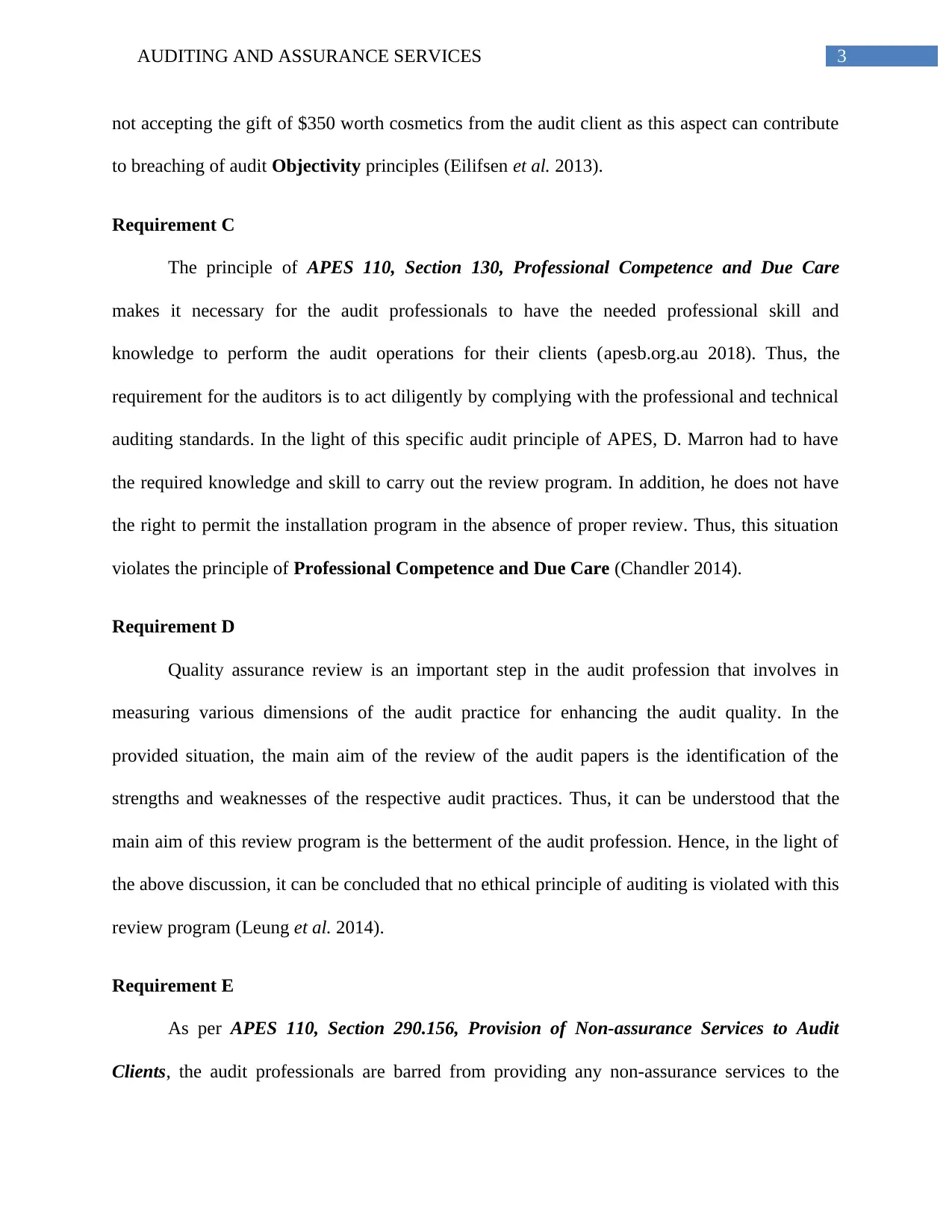
3AUDITING AND ASSURANCE SERVICES
not accepting the gift of $350 worth cosmetics from the audit client as this aspect can contribute
to breaching of audit Objectivity principles (Eilifsen et al. 2013).
Requirement C
The principle of APES 110, Section 130, Professional Competence and Due Care
makes it necessary for the audit professionals to have the needed professional skill and
knowledge to perform the audit operations for their clients (apesb.org.au 2018). Thus, the
requirement for the auditors is to act diligently by complying with the professional and technical
auditing standards. In the light of this specific audit principle of APES, D. Marron had to have
the required knowledge and skill to carry out the review program. In addition, he does not have
the right to permit the installation program in the absence of proper review. Thus, this situation
violates the principle of Professional Competence and Due Care (Chandler 2014).
Requirement D
Quality assurance review is an important step in the audit profession that involves in
measuring various dimensions of the audit practice for enhancing the audit quality. In the
provided situation, the main aim of the review of the audit papers is the identification of the
strengths and weaknesses of the respective audit practices. Thus, it can be understood that the
main aim of this review program is the betterment of the audit profession. Hence, in the light of
the above discussion, it can be concluded that no ethical principle of auditing is violated with this
review program (Leung et al. 2014).
Requirement E
As per APES 110, Section 290.156, Provision of Non-assurance Services to Audit
Clients, the audit professionals are barred from providing any non-assurance services to the
not accepting the gift of $350 worth cosmetics from the audit client as this aspect can contribute
to breaching of audit Objectivity principles (Eilifsen et al. 2013).
Requirement C
The principle of APES 110, Section 130, Professional Competence and Due Care
makes it necessary for the audit professionals to have the needed professional skill and
knowledge to perform the audit operations for their clients (apesb.org.au 2018). Thus, the
requirement for the auditors is to act diligently by complying with the professional and technical
auditing standards. In the light of this specific audit principle of APES, D. Marron had to have
the required knowledge and skill to carry out the review program. In addition, he does not have
the right to permit the installation program in the absence of proper review. Thus, this situation
violates the principle of Professional Competence and Due Care (Chandler 2014).
Requirement D
Quality assurance review is an important step in the audit profession that involves in
measuring various dimensions of the audit practice for enhancing the audit quality. In the
provided situation, the main aim of the review of the audit papers is the identification of the
strengths and weaknesses of the respective audit practices. Thus, it can be understood that the
main aim of this review program is the betterment of the audit profession. Hence, in the light of
the above discussion, it can be concluded that no ethical principle of auditing is violated with this
review program (Leung et al. 2014).
Requirement E
As per APES 110, Section 290.156, Provision of Non-assurance Services to Audit
Clients, the audit professionals are barred from providing any non-assurance services to the
Secure Best Marks with AI Grader
Need help grading? Try our AI Grader for instant feedback on your assignments.
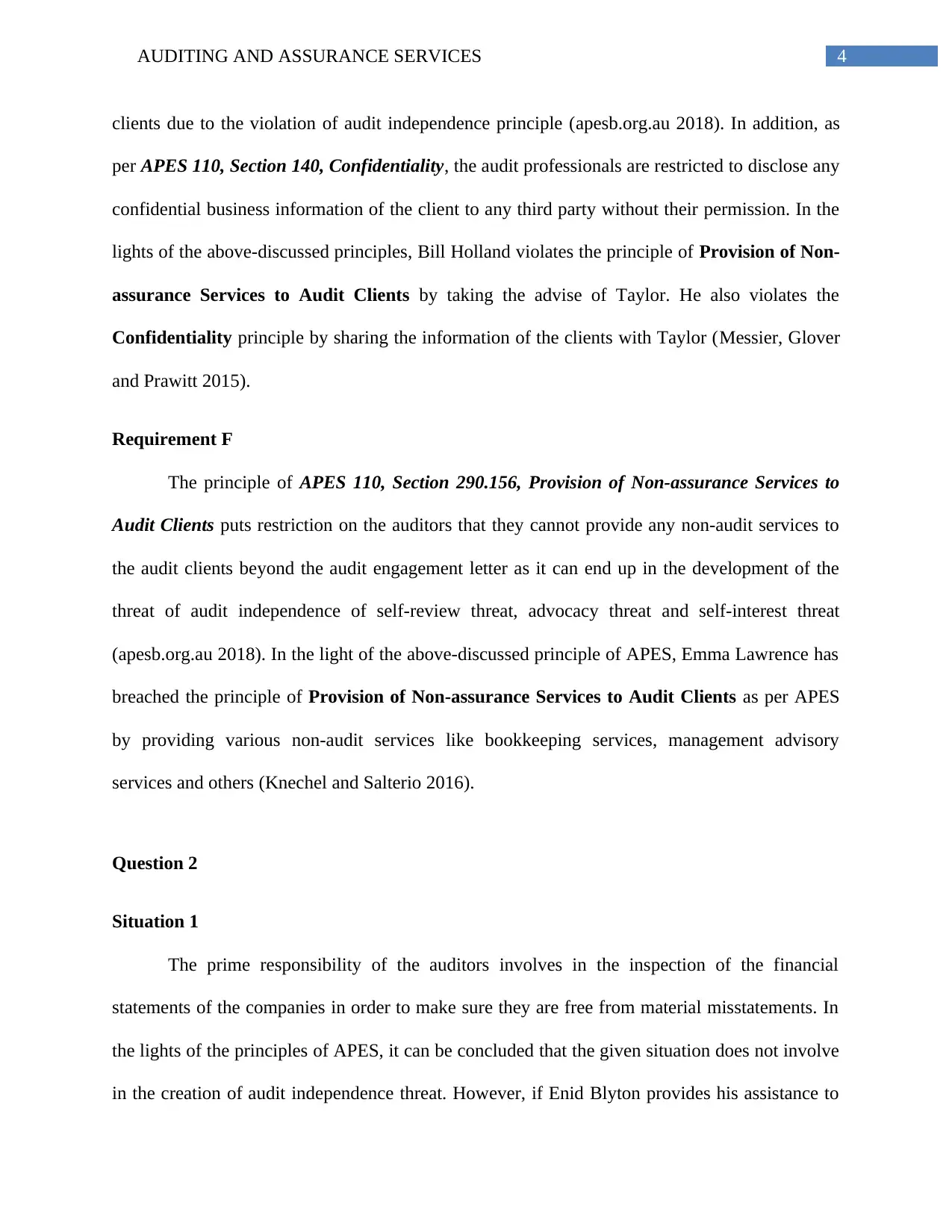
4AUDITING AND ASSURANCE SERVICES
clients due to the violation of audit independence principle (apesb.org.au 2018). In addition, as
per APES 110, Section 140, Confidentiality, the audit professionals are restricted to disclose any
confidential business information of the client to any third party without their permission. In the
lights of the above-discussed principles, Bill Holland violates the principle of Provision of Non-
assurance Services to Audit Clients by taking the advise of Taylor. He also violates the
Confidentiality principle by sharing the information of the clients with Taylor (Messier, Glover
and Prawitt 2015).
Requirement F
The principle of APES 110, Section 290.156, Provision of Non-assurance Services to
Audit Clients puts restriction on the auditors that they cannot provide any non-audit services to
the audit clients beyond the audit engagement letter as it can end up in the development of the
threat of audit independence of self-review threat, advocacy threat and self-interest threat
(apesb.org.au 2018). In the light of the above-discussed principle of APES, Emma Lawrence has
breached the principle of Provision of Non-assurance Services to Audit Clients as per APES
by providing various non-audit services like bookkeeping services, management advisory
services and others (Knechel and Salterio 2016).
Question 2
Situation 1
The prime responsibility of the auditors involves in the inspection of the financial
statements of the companies in order to make sure they are free from material misstatements. In
the lights of the principles of APES, it can be concluded that the given situation does not involve
in the creation of audit independence threat. However, if Enid Blyton provides his assistance to
clients due to the violation of audit independence principle (apesb.org.au 2018). In addition, as
per APES 110, Section 140, Confidentiality, the audit professionals are restricted to disclose any
confidential business information of the client to any third party without their permission. In the
lights of the above-discussed principles, Bill Holland violates the principle of Provision of Non-
assurance Services to Audit Clients by taking the advise of Taylor. He also violates the
Confidentiality principle by sharing the information of the clients with Taylor (Messier, Glover
and Prawitt 2015).
Requirement F
The principle of APES 110, Section 290.156, Provision of Non-assurance Services to
Audit Clients puts restriction on the auditors that they cannot provide any non-audit services to
the audit clients beyond the audit engagement letter as it can end up in the development of the
threat of audit independence of self-review threat, advocacy threat and self-interest threat
(apesb.org.au 2018). In the light of the above-discussed principle of APES, Emma Lawrence has
breached the principle of Provision of Non-assurance Services to Audit Clients as per APES
by providing various non-audit services like bookkeeping services, management advisory
services and others (Knechel and Salterio 2016).
Question 2
Situation 1
The prime responsibility of the auditors involves in the inspection of the financial
statements of the companies in order to make sure they are free from material misstatements. In
the lights of the principles of APES, it can be concluded that the given situation does not involve
in the creation of audit independence threat. However, if Enid Blyton provides his assistance to
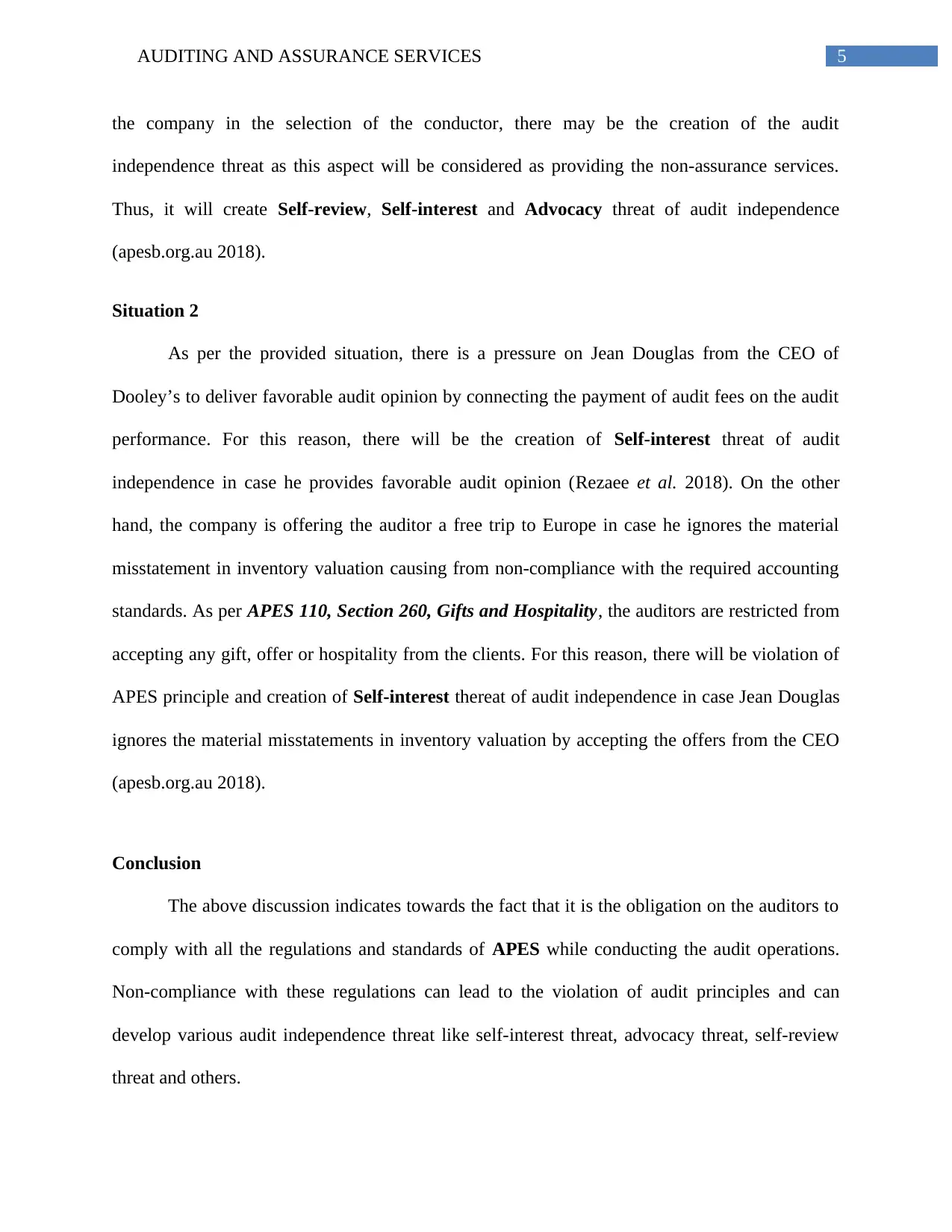
5AUDITING AND ASSURANCE SERVICES
the company in the selection of the conductor, there may be the creation of the audit
independence threat as this aspect will be considered as providing the non-assurance services.
Thus, it will create Self-review, Self-interest and Advocacy threat of audit independence
(apesb.org.au 2018).
Situation 2
As per the provided situation, there is a pressure on Jean Douglas from the CEO of
Dooley’s to deliver favorable audit opinion by connecting the payment of audit fees on the audit
performance. For this reason, there will be the creation of Self-interest threat of audit
independence in case he provides favorable audit opinion (Rezaee et al. 2018). On the other
hand, the company is offering the auditor a free trip to Europe in case he ignores the material
misstatement in inventory valuation causing from non-compliance with the required accounting
standards. As per APES 110, Section 260, Gifts and Hospitality, the auditors are restricted from
accepting any gift, offer or hospitality from the clients. For this reason, there will be violation of
APES principle and creation of Self-interest thereat of audit independence in case Jean Douglas
ignores the material misstatements in inventory valuation by accepting the offers from the CEO
(apesb.org.au 2018).
Conclusion
The above discussion indicates towards the fact that it is the obligation on the auditors to
comply with all the regulations and standards of APES while conducting the audit operations.
Non-compliance with these regulations can lead to the violation of audit principles and can
develop various audit independence threat like self-interest threat, advocacy threat, self-review
threat and others.
the company in the selection of the conductor, there may be the creation of the audit
independence threat as this aspect will be considered as providing the non-assurance services.
Thus, it will create Self-review, Self-interest and Advocacy threat of audit independence
(apesb.org.au 2018).
Situation 2
As per the provided situation, there is a pressure on Jean Douglas from the CEO of
Dooley’s to deliver favorable audit opinion by connecting the payment of audit fees on the audit
performance. For this reason, there will be the creation of Self-interest threat of audit
independence in case he provides favorable audit opinion (Rezaee et al. 2018). On the other
hand, the company is offering the auditor a free trip to Europe in case he ignores the material
misstatement in inventory valuation causing from non-compliance with the required accounting
standards. As per APES 110, Section 260, Gifts and Hospitality, the auditors are restricted from
accepting any gift, offer or hospitality from the clients. For this reason, there will be violation of
APES principle and creation of Self-interest thereat of audit independence in case Jean Douglas
ignores the material misstatements in inventory valuation by accepting the offers from the CEO
(apesb.org.au 2018).
Conclusion
The above discussion indicates towards the fact that it is the obligation on the auditors to
comply with all the regulations and standards of APES while conducting the audit operations.
Non-compliance with these regulations can lead to the violation of audit principles and can
develop various audit independence threat like self-interest threat, advocacy threat, self-review
threat and others.
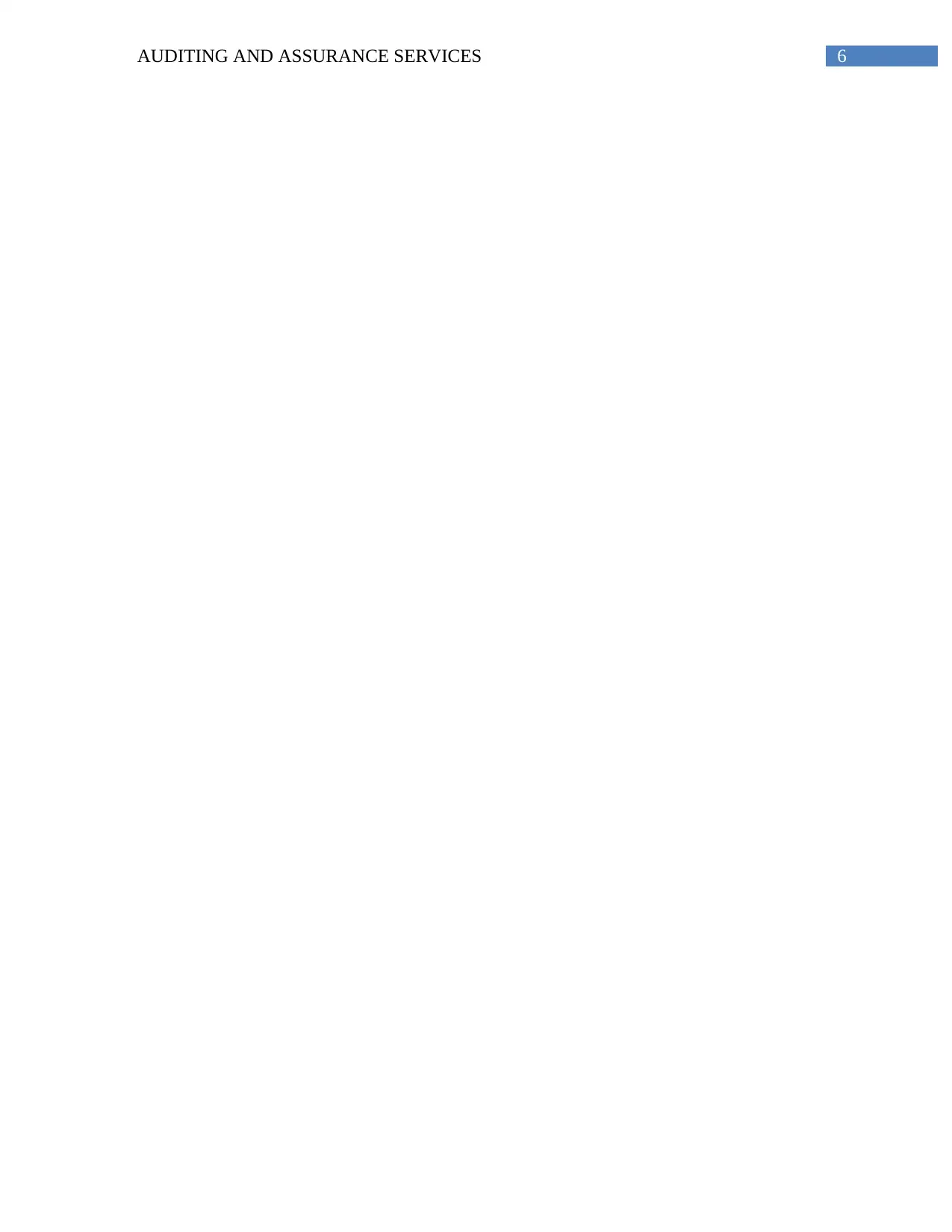
6AUDITING AND ASSURANCE SERVICES
Paraphrase This Document
Need a fresh take? Get an instant paraphrase of this document with our AI Paraphraser
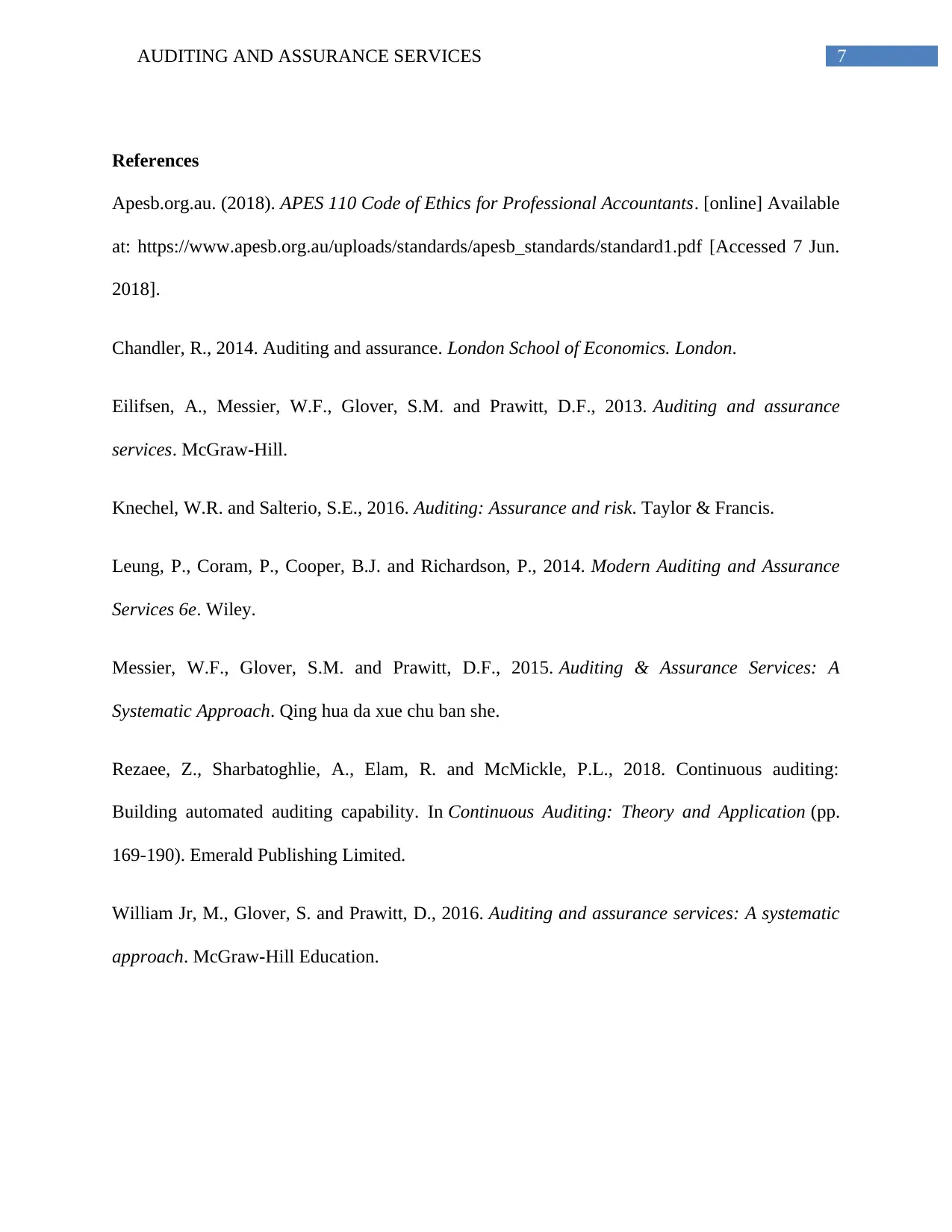
7AUDITING AND ASSURANCE SERVICES
References
Apesb.org.au. (2018). APES 110 Code of Ethics for Professional Accountants. [online] Available
at: https://www.apesb.org.au/uploads/standards/apesb_standards/standard1.pdf [Accessed 7 Jun.
2018].
Chandler, R., 2014. Auditing and assurance. London School of Economics. London.
Eilifsen, A., Messier, W.F., Glover, S.M. and Prawitt, D.F., 2013. Auditing and assurance
services. McGraw-Hill.
Knechel, W.R. and Salterio, S.E., 2016. Auditing: Assurance and risk. Taylor & Francis.
Leung, P., Coram, P., Cooper, B.J. and Richardson, P., 2014. Modern Auditing and Assurance
Services 6e. Wiley.
Messier, W.F., Glover, S.M. and Prawitt, D.F., 2015. Auditing & Assurance Services: A
Systematic Approach. Qing hua da xue chu ban she.
Rezaee, Z., Sharbatoghlie, A., Elam, R. and McMickle, P.L., 2018. Continuous auditing:
Building automated auditing capability. In Continuous Auditing: Theory and Application (pp.
169-190). Emerald Publishing Limited.
William Jr, M., Glover, S. and Prawitt, D., 2016. Auditing and assurance services: A systematic
approach. McGraw-Hill Education.
References
Apesb.org.au. (2018). APES 110 Code of Ethics for Professional Accountants. [online] Available
at: https://www.apesb.org.au/uploads/standards/apesb_standards/standard1.pdf [Accessed 7 Jun.
2018].
Chandler, R., 2014. Auditing and assurance. London School of Economics. London.
Eilifsen, A., Messier, W.F., Glover, S.M. and Prawitt, D.F., 2013. Auditing and assurance
services. McGraw-Hill.
Knechel, W.R. and Salterio, S.E., 2016. Auditing: Assurance and risk. Taylor & Francis.
Leung, P., Coram, P., Cooper, B.J. and Richardson, P., 2014. Modern Auditing and Assurance
Services 6e. Wiley.
Messier, W.F., Glover, S.M. and Prawitt, D.F., 2015. Auditing & Assurance Services: A
Systematic Approach. Qing hua da xue chu ban she.
Rezaee, Z., Sharbatoghlie, A., Elam, R. and McMickle, P.L., 2018. Continuous auditing:
Building automated auditing capability. In Continuous Auditing: Theory and Application (pp.
169-190). Emerald Publishing Limited.
William Jr, M., Glover, S. and Prawitt, D., 2016. Auditing and assurance services: A systematic
approach. McGraw-Hill Education.
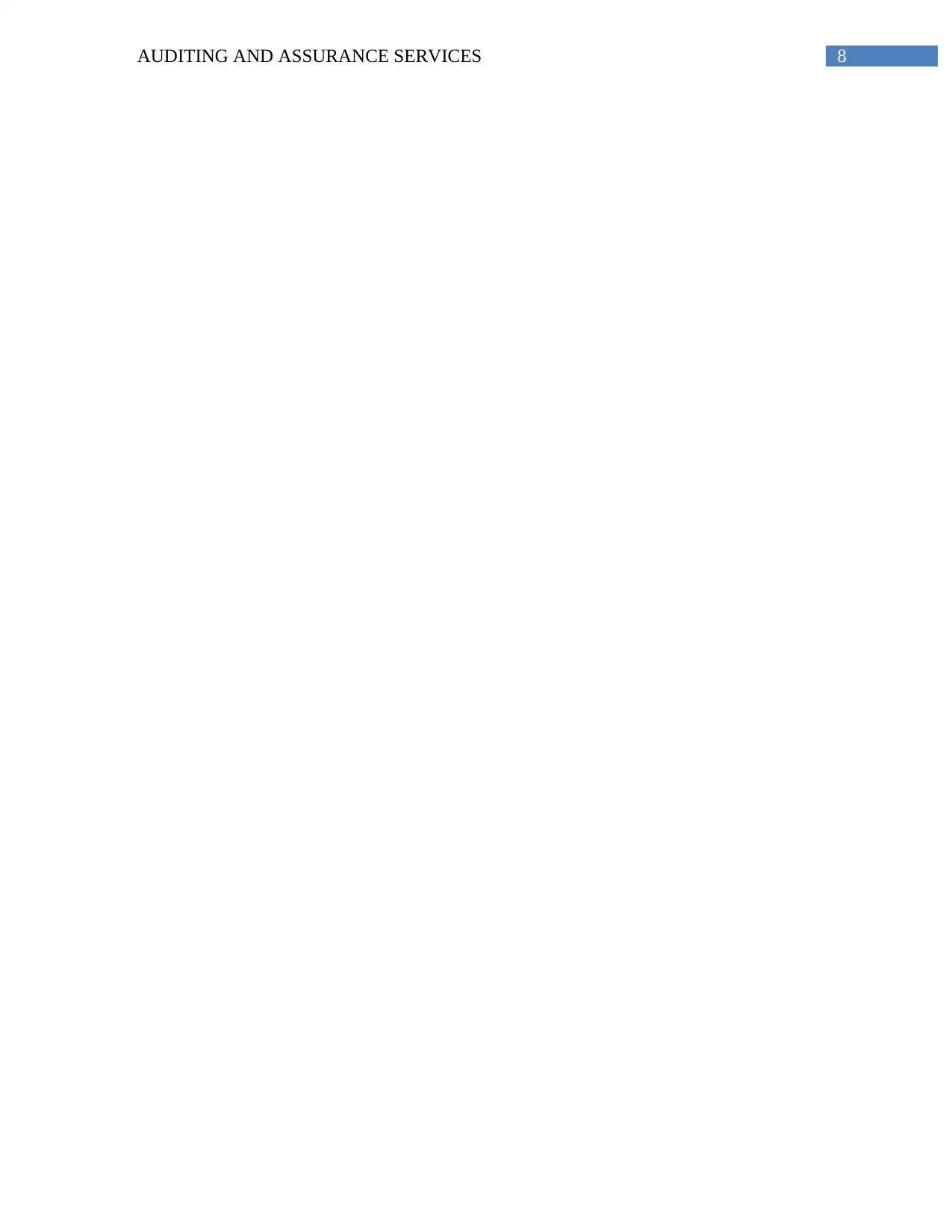
8AUDITING AND ASSURANCE SERVICES
1 out of 9
Related Documents
Your All-in-One AI-Powered Toolkit for Academic Success.
+13062052269
info@desklib.com
Available 24*7 on WhatsApp / Email
![[object Object]](/_next/static/media/star-bottom.7253800d.svg)
Unlock your academic potential
© 2024 | Zucol Services PVT LTD | All rights reserved.


